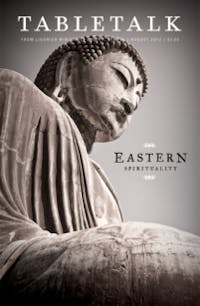
Request your free, three-month trial to Tabletalk magazine. You’ll receive the print issue monthly and gain immediate digital access to decades of archives. This trial is risk-free. No credit card required.
Try Tabletalk NowAlready receive Tabletalk magazine every month?
Verify your email address to gain unlimited access.
My son, Danny, came home from his Japanese baseball practice exclaiming, “Dad, coach is making us worship the ground.” The coach had required them to bow toward the ground in worship. I called a Japanese pastor who said that this was indeed false worship. He reminded me that Japan is pantheistic, like Eastern religions generally. Everything is “god.” There is no distinction between the Creator and creation. In that worldview, it is proper to worship your playing field. This later became a problem for Danny at practice when he would not bow.
The first error in Eastern religion is that there is no God with a big G. The gods are small and many, including ancestors, the emperor, statues, and thousands more. Atheists in the West do not believe in “God”; Japanese atheists do not believe in “the gods.”
Islam has the opposite error—only a transcendent Allah with no immanence, no Emmanuel (“God with us”).
In the West, we have assumed “God.” In my American denomination, the first church-membership vow is not about God but about sin. Our Japanese denomination’s first membership question is necessarily about belief in “the true and living creator God.” The second question deals with sin, and the third with salvation through Christ alone.
We were missionaries in Japan for four years before we saw the first Japanese person converted. But in our third year, an international college student stayed with us. We shared the gospel with Phillip. He professed his faith in Christ within three days. I thought about all the Japanese people we had loved and shared the gospel with as they came into our home, yet with no apparent fruit. I finally understood. Phillip was from the Philippines, the only “Christianized” Asian nation. He believed many correct things about God. He believed God is triune, holy, merciful, omnipotent, omniscient, and so on. He liked Jesus. He simply had not understood grace.
Phillip’s heart was prepared for the gospel just like the hearts of many God-fearing Gentiles of the Roman Empire where the Apostle Paul labored. Paul went first to the synagogues in every town. The influence of the Jews and their belief in one God was everywhere. Cornelius and Lydia were God-fearing Gentiles prepared for the gospel by this influence.
Without a correct view of God, the gospel seems foolish and unnecessary to those with an Eastern religious worldview. Without the omniscient, thrice-holy God (Isa. 6:3ff), there is no understanding of sin. There is not even a good word in Japanese for the concept of forensic guilt before God. So, there is no need for “the foolishness of the cross.”
No absolute God means no absolutes. Everything is relative. This false worldview also pushes man toward self-sufficiency. A famous Japanese saying speaks of the Samurai who has not eaten for days but is picking his teeth with a toothpick. He cannot show need, the opposite attitude of gospel thinking.
Without the fear of God, fear of man dominates. Fear of man and the incredible “results” this false worldview can bring might seem good on the surface. It can produce excellence, quality cars, and a polite, diligent society. But the man-centered, “God-less” motivation and drive behind all of these apparently good things also have a tremendous effect in the form of the depression epidemic, suicide rate, and family dysfunction seen in Japan and other Asian countries. Suicide rates are soaring in the fast-growing Asian economies of Japan, China, and other nations. Asian countries with high rates of atheism also tend to have high rates of suicide. If man is not a created being in the image of God, he has no intrinsic value.
One Japanese man who came to Christ in our church became very excited about the gospel. Speaking of his former worldview with no right concept of God, he said that it was like having a wrong operating system in a computer. Even if a good file was opened, it could not be read because the system software was bad. He said, “We Japanese need to delete the faulty system software and reinstall correct system software where the true and living God is central. Then we can understand the world, truth, and the gospel.”
Eastern religion is bankrupt. We hear the sounding of the gong at 6:00 every morning from the local Shinto shrine to wake the gods. They do not wake.
Few Japanese really believe Buddhism and Shintoism. It is more cultural, like nominal American Christianity. One friend is an “elder” in both a Shinto shrine and a Buddhist temple, but he believes neither religion. Having lived in Asia for more than twenty-five years and seen Eastern religion’s error and impotence, I am surprised at its rise in the West.
Conversely, Asians are flocking to the gospel from their Eastern religious backgrounds. The growth of Christ’s church in China, India, Nepal, and other Asian countries is well documented.
We should expect this, as God has promised that multitudes will come to Him from the East, as well as the West (Isa. 43:5ff; Matt. 8:11).
Paul said the gospel was foolishness to the Gentiles (1 Cor. 1:23) who had a low view of God like today’s Eastern religions. From Scripture we know true foolishness: “The fool has said in his heart, ‘There is no God'” (Ps. 53:1).
